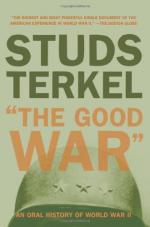
|
| Name: _________________________ | Period: ___________________ |
This test consists of 15 multiple choice questions and 5 short answer questions.
Multiple Choice Questions
1. What does Jun Kurose say that the Friends Service Committee advised Japanese internees to do?
(a) Arm themselves for self-defense.
(b) Refuse to leave their homes.
(c) Find attorneys to plead their cause.
(d) Go willingly to the camps.
2. What causes the disease of beriberi, that stops kidney function?
(a) Lack of Vitamin C.
(b) Lack of Vitamin B1.
(c) Lack of protein.
(d) Lack of potassium.
3. Why did Mike Royko spent nights in a pitch-black apartment as a child during the war?
(a) His parents were too poor to pay for electricity.
(b) The air raid wardens called for blackouts.
(c) The government cut off electricity.
(d) Chicago was under attack.
4. Why did Robert Rasmus believe the Americans should be grateful to the Russians?
(a) The Russians were their comrades and allies.
(b) The Russians opened the door for the American invasion.
(c) The Russians diverted the German army.
(d) The Russians did the lion's share of the fighting.
5. What percentage of the marines in the Guadalcanal campaign were under twenty-one years of age?
(a) Eighty percent.
(b) Twenty percent.
(c) One hundred percent.
(d) Fifty percent.
6. Why did MacArthur land twice when returning to the Philippines?
(a) He wanted to be sure everyone saw the landing.
(b) For the movie cameras.
(c) He forgot his hat.
(d) He didn't feel well and went back to the ship.
7. What did Betty Hutchinson say WWII veterans told their children about the war?
(a) Nothing.
(b) Funny events.
(c) Patriotic slogans.
(d) Horror stories.
8. How did Frank Keegan respond to the bombing of Hiroshima?
(a) He thought it was horrible because it killed innocent people.
(b) He thought it was unnecessary because they were winning anyway.
(c) He thought it was great because it stopped the war.
(d) He thought it was a miracle because it was new technology.
9. What was each soldier's ration of cigarettes?
(a) A pack a week.
(b) A carton a week.
(c) A carton a day.
(d) A pack a day.
10. Why didn't Maurice Wilson think the Filipinos would hide American escapees from the Japanese prison camp?
(a) The Filipinos were afraid of the Japanese.
(b) The Filipinos hated the Americans.
(c) The Filipinos were enemies as well.
(d) The Filipinos would turn them in for the reward.
11. What did Maurice Wilson think when he saw the Japanese war planes over Hawaii?
(a) "Here comes trouble."
(b) "Look what pretty planes we got."
(c) "Makes you proud to be an American."
(d) "Today might be my last on earth."
12. How did John Ciardi feel about the dropping of the atomic bomb?
(a) He had regained faith in his country.
(b) He had won the lottery.
(c) He had no further reason to live.
(d) He had lost the lottery.
13. Why did Peter Bezich's son go to prison?
(a) He refused to be drafted.
(b) He tried to assassinate the president.
(c) He burned the flag.
(d) He joined the Communist party.
14. Why were the soldiers forbidden to keep diaries?
(a) They were instructed to forget the tragedies they saw.
(b) Families should be protected from sad information.
(c) There would be no time to sit and write.
(d) Diaries found by the enemy could give information.
15. What does Lekachman believe World War II veterans feel about their war experiences?
(a) They were gullible and deceived then.
(b) They were fortunate then.
(c) They were better and more important then.
(d) They were foolish and frightened then.
Short Answer Questions
1. What does John Ciardi believe could make anyone savage?
2. What changes does Admiral Larocque believe WWII caused in American national consciousness?
3. What worried Peggy Terry when the tetryl she was working with turned her hair orange?
4. Why were American soldiers anxious to get points for earning medals?
5. What does Peter Ota tell us is worse than death in Japanese culture?
|
This section contains 680 words (approx. 3 pages at 300 words per page) |

|




